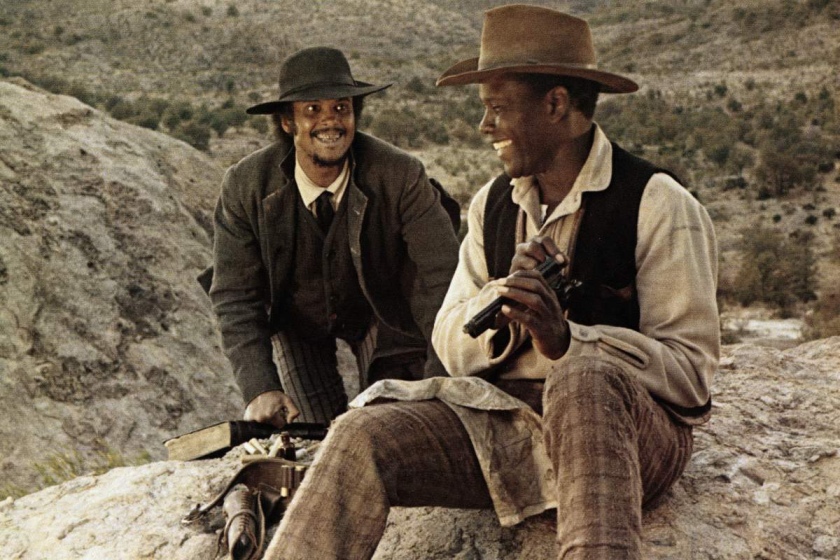
Sir Sidney Poitier KBE (February 20, 1927 – January 7, 2022) was a Bahamian-American retired actor, film director, and ambassador. His entire family lived in the Bahamas, then still a British colony, but Poitier was born unexpectedly in Miami while they were visiting for the weekend, which automatically granted him American citizenship. He grew up in the Bahamas, but moved back to Miami aged 15 and to New York when he was 16. He joined the North American Negro Theatre, making his credited film debut in Joseph L. Mankiewicz‘s No Way Out (1950), with Richard Widmark, Linda Darnell, and Stephen McNally.

Other early roles include Cry, The Beloved Country (1951), with Canada Lee, Charles Carson, and Joyce Carey; Budd Boetticher‘s Red Ball Express (1952), with Jeff Chandler and Alex Nicol; Go, Man, Go! (1954), with Dane Clark, Ruby Dee, Patricia Breslin, The Harlem Globetrotters, and Slim Gaillard; Richard Brooks’ Blackboard Jungle (1955), with Glenn Ford, Vic Morrow, Anne Francis, and Louis Calhern; and William A. Wellman’s Good-bye, My Lady (1956), with Walter Brennan, Phil Harris, Brandon de Wilde, William Hopper, Louise Beavers.

Films in the late 1950s include Martin Ritt‘s Edge of the City (1957), with John Cassavetes and Jack Warden; Brooks’ Something of Value (1957), with Rock Hudson, Dana Wynter, and Wendy Hiller; Michael Audley’s The Mark of the Hawk (1957), with Eartha Kitt and John McIntire; and Pat Jackson’s Virgin Island (1958), with Cassavetes and Virginia Maskell.

For his performance in Stanley Kramer‘s The Defiant Ones (1958), he received his first Best Actor Academy Award nomination (along with co-star Tony Curtis); he was also nominated for a Golden Globe Award for Best Actor – Motion Picture Drama, a Laurel Award for Top Male Dramatic Performance, while winning a BAFTA Award for Best Actor in a Leading Role and Silver Bear for Best Actor. He was also nominated for a Golden Globe Award for Best Actor – Motion Picture Musical or Comedy for his performance in Otto Preminger‘s Porgy and Bess (1959), with Dorothy Dandrige, Sammy Davis Jr., Pearl Bailey, Brock Peters, and Diahann Carroll.

Films in the 1960s include Hall Bartlett’s All the Young Men (1960), with Alan Ladd; Daniel Petrie’s adaption of A Raisin in the Sun (1961), with Dee, Claudia McNeil, Diana Sands, Roy Glenn, and Louis Gossett Jr.; Ritt’s Paris Blues (1961), with Paul Newman, Joanne Woodward, and Louis Armstrong; Hubert Cornfield’s Pressure Point (1962), with Bobby Darin; Jack Cardiff’s The Long Ships (1963), with Widmark, Russ Tamblyn, and Rosanna Schiaffino.

Poitier became the first black male and Afro-Bahamian to win the Academy Award for Best Actor for his performance in Ralph Nelson’s Lilies in the Field (1963), with Lilia Skala, Stanley Adams, and Dan Frazer. He also won the Golden Globe Award for Best Actor – Motion Picture Drama and Silver Bear for Best Actor, and was nominated for the BAFTA Award for Best Actor in a Leading Role, the Laurel Award for Top Male Dramatic Performance, and the New York Film Critics Circle Award for Best Actor.

Other films in the 1960s include The Bedford Incident (1965), with Widmark, Eric Portman, James MacArthur, Martin Balsam, Wally Cox, Donald Sutherland, and Ed Bishop; A Patch of Blue (1965), with Shelley Winters, Elizabeth Hartman, and Wallace Ford; Sydney Pollack’s The Slender Thread (1965), with Anne Bancroft, Telly Savalas, Steven Hill, and Ed Asner; Duel at Diablo (1966), with James Garner; To Sir, with Love (1967), with Christian Roberts, Judy Geeson, Suzy Kendall, and Lulu; For Love of Ivy (1968), with Abbey Lincoln, Beau Bridges, Nan Martin, Lauri Peters, and Carroll O’Connor; and The Lost Man (1969), with Joanna Shimkus (who would become his second wife).

Poitier’s two other best known roles of the 1960s include Det. Virgil Tibbs in Norman Jewison’s In the Heat of the Night (1967), with Rod Steiger, Lee Grant, and Warren Oates; and Dr. John Wade Prentice in Kramer’s Guess Who’s Coming to Dinner (1967), with Spencer Tracy, Katharine Hepburn, Katharine Houghton, Beah Richards, and Roy E. Glenn. He would reprise his role of Tibbs in They Call Me Mister Tibbs! (1970), with Martin Landau and Barbara McNair; and The Organization (1971), with McNair, Gerald S. O’Laughlin, Sheree North, and Raul Julia.

He made his directorial debut with the western Buck and the Preacher (1972), with Harry Belafonte, Dee, and Cameron Mitchell. This was followed by A Warm December (1973), with Esther Anderson. He then directed and co-starred in three films with Bill Cosby: Uptown Saturday Night (1974), with Belafonte; Let’s Do it Again (1975), with Calvin Lockhart, John Amos, Julius Harris, Denise Nicholas, Lee Chamberlin, Mel Stewart, Jimmie Walker, Ossie Davis; and A Piece of the Action (1977), with James Earl Jones, Denise Nicholas, Hope Clarke, Tracy Reed, and Titos Vandis. Other films from this time include Brother John (1971), with Will Geer and Bradford Dillman; and The Wilby Conspiracy (1975), with Michael Caine, Nicol Williamson, and Prunella Gee.

Poitier focused mainly on directing in the 1980s, his most popular from this era being Stir Crazy (1980), with Gene Wilder,Richard Pryor, Georg Stanford Brown JoBeth Williams, Craig T. Nelson, Barry Corbin, Jonathan Banks, and Erland Van Lidth. His other two directing efforts from this decade include Hanky Panky (1982), with Wilder, Gilda Radner, Kathleen Quinlan, Widmark, and Johnny Brown; and Fast Forward (1985). His last directorial effort was Ghost Dad (1990), with Cosby, Kimberly Russell, Denise Nicholas, and Ian Bannen.

Poitier returned to acting in Roger Spottiswoode’s Shoot to Kill (1988), with Tom Berenger, Clancy Brown, Andrew Robinson and Kirstie Alley. Other later films include Richard Benjamin‘s Little Nikita (1988), with River Phoenix, Richard Jenkins, Caroline Kava, Richard Bradford, and Richard Lynch; Sneakers (1992), with Robert Redford, Dan Aykroyd, Ben Kingsley, Mary McDonnell, Phoenix, and David Strathairn; and The Jackal (1997), with Bruce Willis, Richard Gere, Diane Verona, Mathilda May, J.K. Simmons, Jack Black, and Tess Harper.

TV movies and miniseries roles included Separate but Equal (1991), with Richard Kiley, Burt Lancaster, Cleavon Little, and Lynne Thigpen; Children of the Dust (1995), with Michael Moriarty, Joanna Going, Hart Bochner, Regina Taylor, Billy Wirth, Robert Guillaume, and Farrah Fawcett; Peter Bogdanovich‘s To Sir, with Love II (1996), with Christian Payton and Dana Eskelson; Mandela and de Klerk (1997), with Caine; Free of Eden (1998), with his Daughter Sydney Tamiia Poitier, Phylicia Rashad, and Robert Hooks; David and Lisa (1999), with Lukas Haas, Brittany Murphy, Debi Mazar, Allison Janney, Kim Murphy, Giuseppe Andrews, Vicellous Reon Shannon, Gene Wolande, and Kimiko Gelman; The Simple Life of Noah Dearborn (1999), with Mary-Louise Parker, Dianne Wiest, and George Newbern; and The Last Brickmaker in America (2001), with Piper Laurie.

Poitier was made an honorary Knight Commander of the Order of the British Empire by Queen Elizabeth II in 1974. In April 1997, Poitier was appointed ambassador of the Bahamas to Japan, a position he held until 2007. From 2002 to 2007, he was concurrently the ambassador of the Bahamas to UNESCO. In 1999, Poitier was ranked 22nd among the male actors on the “100 Years…100 Stars” list by the American Film Institute. In 2002, Poitier was chosen to receive an Academy Honorary Award, in recognition of his “remarkable accomplishments as an artist and as a human being.” In 2009 Poitier was awarded the Presidential Medal of Freedom, the United States’ highest civilian honor. In 2016, he was awarded the BAFTA Fellowship for outstanding lifetime achievement in film. He is one of only two living actors on the list, the other being Sophia Loren.
Each will be linked to the title below.
(*seen originally in theaters)
(**seen rereleased in theaters)
- Sepia Cinderella (1947) – directed by Arthur H. Leonard – uncredited extra
- No Way Out (1950) – directed by Joseph L. Mankiewicz
- Cry, the Beloved Country (1951) – directed by Zoltán Korda
- Red Ball Express (1952) – directed by Budd Boetticher
- Go, Man, Go! (1954) – directed by James Wong Howe
- Blackboard Jungle (1955) – directed by Richard Brooks
- Good-bye, My Lady (1956) – directed by William A. Wellman
- Edge of the City (1957) – directed by Martin Ritt
- Something of Value (1957) – directed by Richard Brooks
- Band of Angels (1957) – directed by Raoul Walsh
- The Mark of the Hawk (1957) – directed by Michael Audley – aka Accused
- The Defiant Ones (1958) – directed by Stanley Kramer
- Virgin Island (1958) – directed by Pat Jackson
- Porgy and Bess (1959) – directed by Otto Preminger
- All the Young Men (1960) – directed by Hall Bartlett
- A Raisin in the Sun (1961) – directed by Daniel Petrie
- Paris Blues (1961) – directed by Martin Ritt
- Pressure Point (1962) – directed by Hubert Cornfield
- Lilies in the Field (1963) – directed by Ralph Nelson
- The Long Ships (1964) – directed by Jack Cardiff
- The Greatest Story Ever Told (1965) – directed by George Stevens
- The Bedford Incident (1965) – directed by James B. Harris – aka Aux Postes De Combat
- A Patch of Blue (1965) – directed by Guy Green
- The Slender Thread (1965) – directed by Sydney Pollack
- Duel at Diablo (1966) – directed by Ralph Nelson
- To Sir, with Love (1967) – directed by James Clavell
- In the Heat of the Night (1967) – directed by Norman Jewison
- Guess Who’s Coming to Dinner (1967) – directed by Stanley Kramer
- For Love of Ivy (1968) – directed by Daniel Mann – also story idea
- The Lost Man (1969) – directed by Robert Alan Aurthur
- King: A Filmed Record… Montgomery to Memphis (1970) – directed by Sidney Lumet & Joseph L. Mankiewicz – documentary – narrator
- They Call Me Mister Tibbs! (1970) – directed by Gordon Douglas
- Brother John (1971) – directed by James Goldstone
- The Organization (1971) – directed by Don Medford
- Buck and the Preacher (1972) – also director – took over from Joseph Sargent
- A Warm December (1973) – also director
- Uptown Saturday Night (1974) – also director
- The Wilby Conspiracy (1975) – directed by Ralph Nelson
- Let’s Do It Again (1975) – also director
- A Piece of the Action (1977) – also director
- Paul Robeson: Tribute to an Artist (1979) – directed by Saul J. Turell – documentary short
- Stir Crazy (1980) – director only
- Hanky Panky (1982) – director only
- Fast Forward (1985) – director only
- Shoot to Kill (1988) – directed by Roger Spottiswoode – aka Deadly Pursuit
- Little Nikita (1988) – directed by Richard Benjamin
- Ghost Dad (1990) – director only
- Separate But Equal (1991) – directed by George Stevens Jr. – miniseries
- Sneakers (1992) – directed by Phil Alden Robinson
- A Century of Cinema (1994) – directed by Caroline Thomas – documentary
- Children of the Dust (1995) – directed by David Greene – miniseries
- Wild Bill: Hollywood Maverick (1995) – directed by Todd Robinson – documentary
- To Sir, With Love II (1996) – directed by Peter Bogdanovich – TV movie
- Mandela and de Klerk (1997) – directed by Joseph Sargent – TV movie
- The Jackal (1997) – directed by Michael Caton-Jones
- Free of Eden (1998) – directed by Leon Ichaso – TV movie
- David and Lisa (1999) – directed by Lloyd Kramer – TV movie
- The Simple Life of Noah Dearborn (1999) – directed by Gregg Champion
- The Last Brickmaker in America (2001) – directed by Gregg Champion – TV movie

